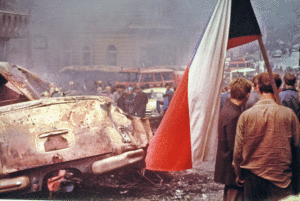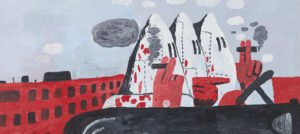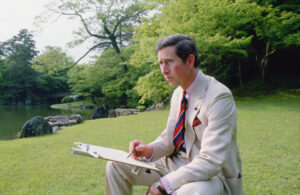Lost in thought again, I pace the humming street with my eyes down. They get into less trouble that way. If the pavements weren’t so cluttered with abandoned rented bicycles and e-scooters, I’d try walking backwards.
I am brooding over words I wrote several weeks ago when describing that species of social embarrassment called not knowing where to look when you pass a school playground of children. “It takes me a moment to remember,” I wrote, “that a man wandering on his own must no longer pause to look at children running races in their mirth.” I did not, I now think, adequately register the sadness of that loss. Scurry from a playground for fear of appearing sinister and we might as well be scurrying from the vitality of life itself.
The worst part of being told you’re sinister for no other reason than that you’re a man out wandering on his own is that, eventually, you begin to fear you might be. But sinister how? What’s the dread clutching at society’s heart? And why is it now clutching at mine?
I hear the children laughing and scuttle past. Here’s the tragedy of it: I am severed from the time when I laughed in a playground myself. The wistful music of continuity is stopped.
How many things are we no longer trusted to look at and admire? I dare not freely name them because that too can be a species of offence. So, I pace the streets with my eyes down, in order not to be surprised by beauty I must not let myself appreciate. The long, brown legs of high-stepping city women in their summer dresses? Eugh! The billowing of someone’s national dress, a fantastical headdress; a lovely child skipping in its self-absorption? Eugh, eugh!
The street’s forbidden fruits, waiting to ambush us the minute we lift our faces. Who are you looking at, mister? Wanna photograph?
Look up, then, if looking ahead is so fraught. There’s a sculpture on the BBC building by Eric Gill. Prospero and Ariel. Old and Young. Eugh! Or quit the street, on which we all once promenaded, sometimes flagrantly if the night was hot, and seek refuge in a cinema or art gallery. They’re showing an old Woody Allen here. Oh, God — it’s Manhattan. Eugh! And here — we’re in luck — is a Gauguin exhibition, the great painter and his young Tahitian bride. Young! How young? Eugh! Eugh! Eugh!
First the streets are denied us, then art. But take the risk out of art and what’s left but decoration? Do we not look to art to probe the borders of the acceptable? Risk is what explains art’s fearful symmetry. Tiger, tiger, burning bright…
I don’t pretend that there’s nothing on those walls to fear. It makes perfect sense to keep a tiger at arm’s length. Art is dangerous and we are right to stand in trembling awe of it. But what we fear is also, much of the time, what we love. We police the borderland, losing in adventure what we gain in safety. Will we one day have to ban beauty itself, shamed by the desires it will unloose, outraged by the liberties that have already been taken to produce it? Am I — one halting, harmless, rheumy, apologetic, mature man — really that inflammable?
Better I stay indoors. Close the windows against sounds that are not mine to hear and draw the curtains against sights that are not mine to see. That way I cause no one discomfort by appearing to take too avid an interest in what they look like, what they’re wearing, how old they are, or where they come from. Walk on, my children, unmolested by my declining sight.
I am not asking for pity. I have lived my life and looked my full. I won’t say no to looking a bit more before my eyes close altogether, but it’s not only on my own behalf that I lament our visual timorousness — there are those who come after who must also be granted the right to stare and be stirred.
There is, I grant you, nothing new about being told to look away. Or suppressing art, come to that. The Puritans tried to close the theatres in the 16th century, blamed the plague on the lasciviousness of theatre-goers, and finally got their way in 1642. But is there not a specific problem with the idea of men looking — as though the eyes of men are configured differently from women’s — that probably dates to the Seventies when John Berger’s Ways of Seeing was published and the conceit of the “male gaze” elaborated? It was after Berger, anyway, that men began to be perceived as gazing suspiciously, and after the film theorist Laura Mulvey’s analysis of looking as an act of male oppression, that their gaze was pronounced out-and-out exploitative. Where the likes of Francis Drake had circled the globe looking for worlds to conquer, men had now only to lift a paintbrush or wander in off the street to look at a painting to be charged with ravishment and pillage.
Ok, ok, cheap shot. Nothing any of us do is wholly innocent. We are all culture-laden whether we know we are or not. The scrutinising eye can be possessive or pornographic — what man can say he has never looked possessively or pornographically? — and it does make sense to talk of some sorts of representation as invasion. Only consider the shape of the paintbrush or the pen. “The paradox of phallocentrism in all its manifestations is that it depends on the image of the castrated woman to give order and meaning to its world,” wrote Laura Mulvey. Oof, yes. Or, at least, oof maybe.
Had I been a woman worn out with being prodded by those instruments of male possessiveness, I’d have bought willingly into that. Call a man phallocentric and you had him every time. The more he shouted and bullied that he wasn’t, the more he was. I remember it well. I was there, denying it loudly myself. Of course, there were some — the Andrew Tates of the age — who pumped their muscles and wore phallocentricity as a badge of pride. But the rest of us knew we were on borrowed time. All right, all right, we said, hanging our heads, but how will we ever again let our senses off the rein? When will the fun return? It won’t, Mulvey told us. Fun had done damage enough. Fun had run its course. Thus was Puritanism revived in another guise.
With nothing that was fun or safe to look upon at home, a number of us did what the beaten have done for centuries, kicked the dust of Europe from our feet and travelled to exotic places. But, in the rush to delegitimise, that pastime, too, lost favour. The very word “exotic” marked us as imperialists. Orientalism, the critic Edward Said called it. Colonising what was foreign by finding it picturesque. Byron and Matisse, Oscar Wilde and Gertrude Bell, Leonardo and Stendhal, the entire fourth form at my school — all guilty. Old and young, men and women — Orientalists the lot of us.
There are accusations of Orientalism and its implicit privileging of whiteness all over the walls of the Rossetti exhibition currently showing at Tate Britain. I am in two minds about notes on the walls of exhibitions. Because I am a word obsessive, I read them conscientiously to the degree that I sometimes forget to look at the paintings they describe. Good wall notes can be engrossing and informative. Bad ones — which might be bad for a variety of reasons but are always bad if they conspicuously promote the pieties and prohibitions of the hour — can spoil the show. The notes accompanying the Rossettis swarm around the works like flies, letting nothing alone that might be construed as ideologically outmoded. Rossetti’s painting “The Beloved” is accused of “misimagining” North Africa, while another painting is guilty of “dehumanising” a North African. Just a question, but as these are value judgements: shouldn’t they be up to us to decide?
Remember Pip in Charles Dickens’s Great Expectations, so hectored and harried by his elders at a family dinner that he might have been an “unfortunate little bull in a Spanish arena… [he was] so smartingly touched up by these moral goads”. Exactly how I felt after two hours of curatorial finger-pointing at Tate Britain.
And so we walk the street of pitfalls and perils, eyes averted, shrinking from the finger. But I guess it’s fair enough: what goes around comes around. Now I know how generations of women felt being touched up by the eyes of men. I get it. Mea culpa. Forgive me, for I have sinned. I have mis-gazed.
This essay was first published on Streetwalking with Howard Jacobson.
Disclaimer
Some of the posts we share are controversial and we do not necessarily agree with them in the whole extend. Sometimes we agree with the content or part of it but we do not agree with the narration or language. Nevertheless we find them somehow interesting, valuable and/or informative or we share them, because we strongly believe in freedom of speech, free press and journalism. We strongly encourage you to have a critical approach to all the content, do your own research and analysis to build your own opinion.
We would be glad to have your feedback.
Source: UnHerd Read the original article here: https://unherd.com/




